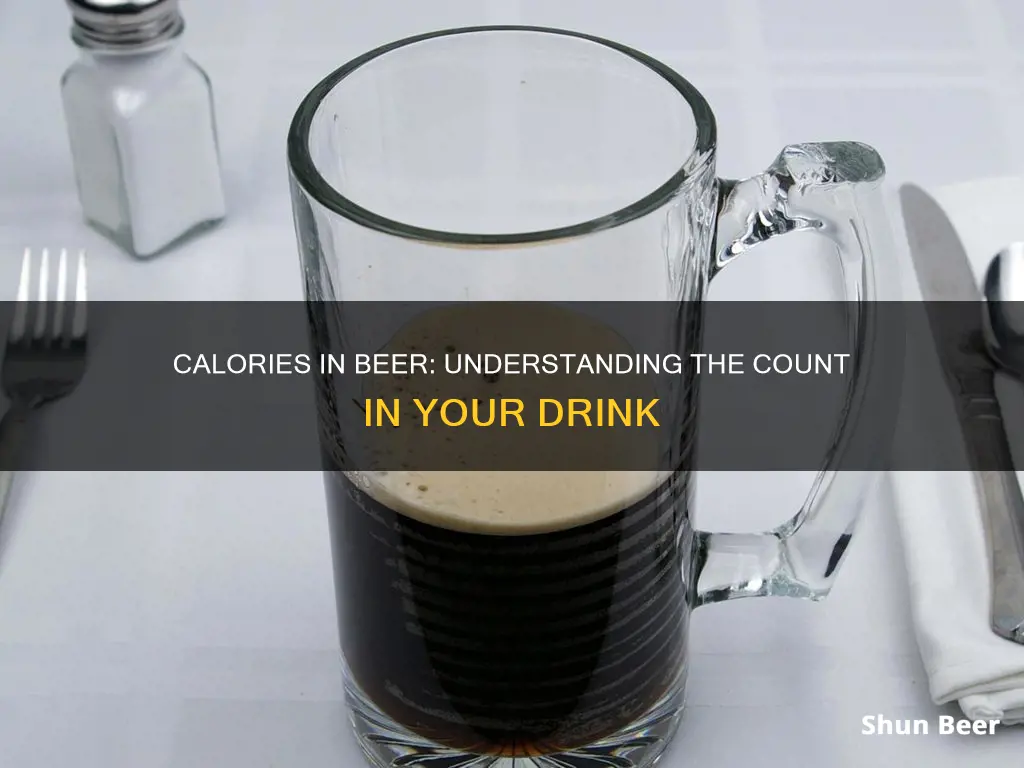
Beer lovers, this one's for you! Ever wondered how many calories are in a regular 12-ounce beer? Well, wonder no more. The answer is... it depends. Yes, we know, that's not a satisfying answer, but bear with us. The calorie content of a 12-ounce beer can vary from as little as 85 calories to as many as 300. But don't worry, we'll break it down for you so you can make informed choices the next time you're at the bar.
What You'll Learn

Beer calories range from 85 to 300+
Beer calories vary depending on the type of beer and the maker. A 12-ounce serving of beer can have as few as 85 calories or as many as 300+ calories. The calorie content is influenced primarily by the alcohol content, with higher ABV beers having more calories. For example, a 5% ABV beer has around 100 calories from alcohol alone, while a 4% ABV beer has approximately 80 calories from alcohol.
In general, light beers have fewer calories than their full-flavored counterparts. A light beer typically has an ABV of around 4% and can range from 50 to 100 calories for a 12-ounce serving. Non-alcoholic beers, which have less than 0.5% ABV, are another low-calorie option. However, some styles of beer, such as imperial stouts or barleywines, can have an ABV of up to 14%, which significantly increases the calorie count.
The calorie count of a beer is influenced not only by its ABV but also by its alcohol by weight and any remaining sugar in the beer (known as the real extract). Additionally, the amount of carbohydrates in a beer depends on how it is made, with darker, sweeter, and thicker beers tending to have more carbs.
When it comes to popular beers in the United States, the calorie count for a standard 12-ounce serving ranges from around 95 calories on the low end to just under 150 calories on the high end. For example, Bud Light has 110 calories, Budweiser has 145 calories, and Coors Light has 102 calories.
Calorie Counting: Red Stripe Beer's Nutritional Breakdown
You may want to see also

Calories from alcohol and carbs
The number of calories in a 12-ounce beer varies depending on the type of beer and its maker. Typically, a 12-ounce beer will contain between 85 and 153 calories, with light beers containing fewer calories, ranging from 50 to 100 calories per 12-ounce serving.
The calories in beer come from two main sources: alcohol and carbohydrates. The alcohol content is the primary factor influencing the calorie count, with higher-alcohol beers tending to have more calories. A 5% ABV beer has around 100 calories from alcohol alone, while a 4% ABV beer has approximately 80 calories from alcohol.
Carbohydrates in beer come from sugars, starches, and fibres found in grains and fruit used in the brewing process. The amount of carbohydrates in a beer depends on how it is made, with darker, sweeter, and thicker beers generally containing more carbs. A 12-ounce portion of beer can contain anywhere from 3 to 16 grams of carbohydrates.
In summary, the calorie content of a 12-ounce beer depends on the alcohol content and the amount of carbohydrates it contains. The type of beer and the maker will also influence the overall calorie count. For those watching their calorie or carbohydrate intake, opting for light beers or beers with lower ABV can be a good choice.
Rainier Beer Calorie Count: Nutritional Facts
You may want to see also

Light beer has fewer calories
The number of calories in a beer varies depending on the beer and its maker. A 12-ounce beer typically contains between 85 and 300 calories. A standard beer contains around 150 calories, while a light beer typically contains between 50 and 100 calories.
The definition of "light beer" varies among brands. Sometimes it means the beer contains less alcohol, sometimes it means fewer calories, and sometimes it means both. For instance, Bud Light contains 103 calories and 4.6 grams of carbohydrates per 12-ounce serving, while Coors Light contains 102 calories and 5 grams of carbohydrates per 12-ounce serving.
Light beers have gained popularity in recent years as brewers cater to various dietary preferences, including lower carbs, fewer calories, and less alcohol. Light beers provide an option for those watching their calorie intake or aiming to reduce weight gain. However, it's important to note that drinking the same quantity of light beer as regular beer may not lead to significant weight loss due to the potential for increased consumption.
Pumpkin Beer Calories: Everything You Need to Know
You may want to see also

Beer has no nutritional boost
A 12-ounce beer typically contains around 150 calories, but this can vary from 85 to 300 depending on the type of beer and its alcohol by volume (ABV). While beer does contain some vitamins and minerals, its nutritional value is negligible, and it is not a good source of nutrients compared to whole foods like fruits and vegetables.
Beer is made from grains, which can be healthy, but that does not mean that drinking beer is good for you. It is often viewed as empty calories, and while moderate drinking may have some health benefits, excessive consumption can lead to various health issues. Beer has no fat and minimal protein, with most of its calories coming from carbohydrates.
The calories in beer are influenced mainly by its alcohol content. A shot of whiskey will have more calories than the same-sized portion of beer because it has a higher alcohol content. Similarly, a typical glass of wine will generally have more calories than a glass of beer of the same size due to its higher ABV. However, some styles of beer, like imperial stouts or barley wines, can have ABVs of up to 14%, rivaling wine.
The number of calories and carbohydrates in beer depends on the specific brew and the amount consumed. Dark beers tend to have more carbohydrates than light beers due to the addition of malts during the brewing process. A 12-ounce can of ale, lager, porter, premium beer, or stout has more than 12 grams of carbohydrates, about four times more than a light beer.
Beer supplies very little protein, with light beers containing about 0.7 grams and regular or dark beers containing about 1.6 grams per serving. While beer does contain some healthy ingredients like brewer's yeast, barley, malt, and hops, as well as folate, niacin, magnesium, and potassium, these are present in much higher quantities in whole foods.
In summary, while beer may contain trace amounts of some vitamins and minerals, its nutritional value is minimal. It is important to consume beer in moderation and be aware of its calorie content to maintain a healthy diet and avoid potential negative health consequences.
Ranger IPA Beer: Calorie Count and Nutrition Facts
You may want to see also

Calories vary by beer and maker
The calorie count in a regular 12-ounce beer varies depending on the type of beer and its maker. UnityPoint Health dietitian, Tricia Leininger, says that beer generally has about 150 calories, but this can range from as few as 85 calories to as many as 300 calories per 12-ounce serving. The calorie content is influenced primarily by the alcohol content, with light beers having fewer calories due to their lower alcohol content.
For example, Budweiser has 145 calories per 12-ounce serving, while Bud Light has 110 calories. Coors Light contains 102 calories, and Corona Extra has 148 calories. Heineken has approximately 149 calories per 12-ounce bottle, and Michelob Ultra has 95 calories. Miller Lite has 96 calories, and Busch Light has 95 calories.
The calorie count in beer also depends on the beer's ABV (alcohol by volume) and the amount of residual sugar and carbohydrates. A 5% ABV beer has around 100 calories from alcohol alone, while a 4% ABV beer has approximately 80 calories from alcohol. Beers with a thicker mouthfeel, darker appearance, and sweeter flavor tend to have more carbohydrates and, thus, more calories.
Blonde Beer Calorie Count: Low-Carb, Low-Guilt Pleasure
You may want to see also
Frequently asked questions
The number of calories in a 12-ounce beer varies depending on the type of beer and its ABV (alcohol by volume). A regular beer typically contains between 85 and 153 calories.
The calorie content in beer is primarily influenced by its alcohol and carbohydrate content. A higher ABV will result in a higher calorie count. Additionally, beers with a thicker mouthfeel, darker appearance, and sweeter flavor tend to have more carbohydrates, contributing to a higher calorie count.
A shot of whiskey will generally have more calories than an equivalent portion of beer due to its higher alcohol content. Similarly, wine typically has a higher ABV than beer, resulting in a higher calorie count for the same volume.
Yes, light beers typically have fewer calories due to their lower alcohol content. A 12-ounce serving of light beer can range from 50 to 100 calories. Additionally, some ultra-light beers, such as Michelob Ultra, can have as few as 95 calories per 12-ounce serving.







